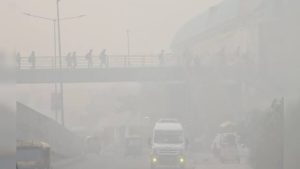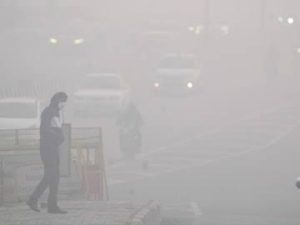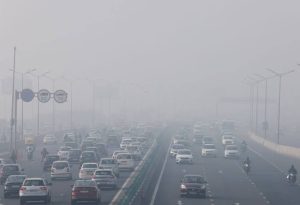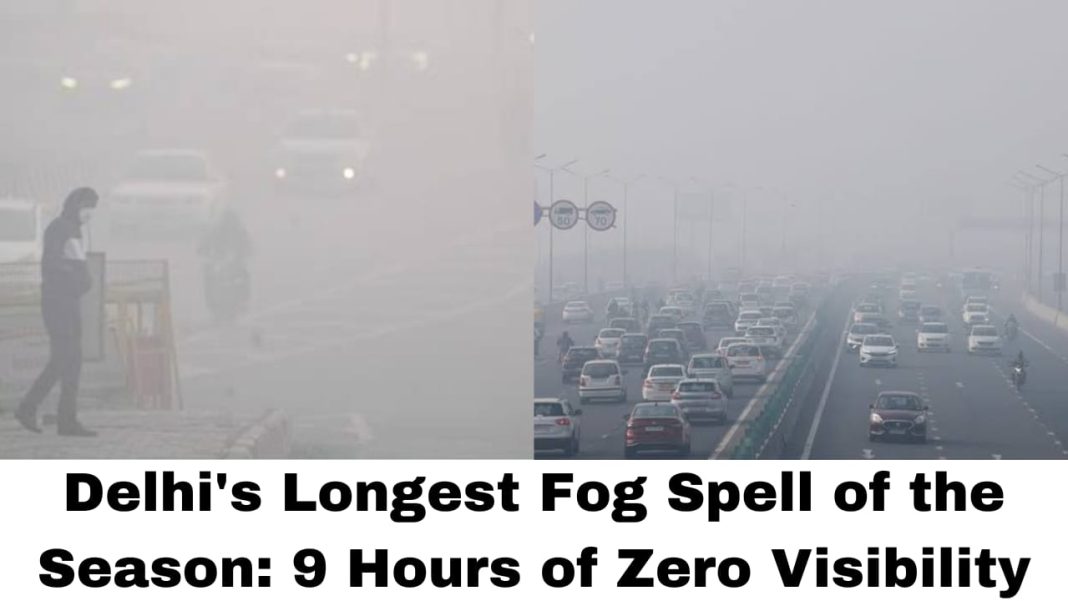Digital News Guru New Delhi Desk:
Delhi’s Zero Visibility: Dense Fog Disrupts Life in the Capital
Delhi recently experienced an unprecedented weather event, with dense fog enveloping the city and reducing visibility to zero for extended periods. This climatic phenomenon caused widespread disruptions in air and rail transportation, impacted daily commutes, and exacerbated existing air quality concerns. While the chilling fog created an eerie yet surreal atmosphere, it brought with it significant challenges for residents, travelers, and authorities alike.
Longest Zero Visibility Spell of the Season
The India Meteorological Department (IMD) reported that Delhi witnessed its longest zero-visibility spell of the season, lasting nine hours at Palam and eight hours at Safdarjung. Starting in the late evening and persisting until the early morning hours, the dense fog blanketed the city, significantly disrupting daily activities.

The visibility drop was due to a combination of factors, including high humidity levels, low temperatures, and calm winds, which are common during winter in northern India. However, this prolonged spell of fog was unusual even by Delhi’s winter standards, with many residents describing the city as eerily shrouded in a thick white haze.
Impact on Air Travel
The zero-visibility conditions wreaked havoc on air travel, particularly at Delhi’s Indira Gandhi International Airport, one of the busiest in the country. Over 400 flights were delayed, with 19 flights being diverted to other airports. Several flights were canceled altogether, leaving thousands of passengers stranded and frustrated.
Airlines like IndiGo and SpiceJet issued advisories, urging passengers to check their flight statuses before heading to the airport. Flights equipped with advanced navigation and landing systems, such as Category III Instrument Landing System (ILS), managed to operate, but those without the required equipment faced significant challenges.
The disruptions highlighted the vulnerability of air travel to extreme weather conditions and underscored the importance of advanced infrastructure to mitigate such impacts.
Rail Travel Disruptions
The fog also caused widespread delays in rail transportation. Over 80 trains were delayed as visibility dropped to near-zero levels. With train speeds significantly reduced for safety, passengers had to endure long waits and uncertainty. This disruption was especially inconvenient for those traveling for work or holidays, adding to the chaos caused by the extreme weather.
Indian Railways deployed additional personnel to manage operations during the foggy conditions and minimize the impact on schedules. However, the sheer density of the fog made it challenging to maintain normal operations.
Effect on Road Traffic
The dense fog created hazardous driving conditions on Delhi’s roads, with several minor accidents reported due to poor visibility. Drivers struggled to navigate through the thick fog, leading to slower traffic and longer commute times. The authorities advised drivers to use fog lights, maintain safe distances, and avoid high-speed travel during such conditions.

For pedestrians, crossing roads became a perilous task, as vehicles often failed to spot them in time. The combination of dense fog and inadequate street lighting further compounded the risks.
Air Quality Concerns
The dense fog exacerbated Delhi’s already alarming air quality issues. The Air Quality Index (AQI) during this period hovered around 351, placing it in the “very poor” category. Such levels pose significant health risks, particularly for individuals with respiratory conditions, children, and the elderly.
The fog trapped pollutants close to the ground, creating a smog-like effect. Residents reported experiencing irritation in their eyes, throat, and lungs, and many avoided outdoor activities to minimize exposure to the polluted air.
Weather Outlook
The IMD has forecasted that similar foggy conditions may persist in the coming weeks as winter continues. Delhi’s temperatures remain low, with a maximum of 20 degrees Celsius and a minimum of 7.8 degrees Celsius recorded during the zero-visibility spell. Such weather patterns are expected to persist, maintaining the possibility of further disruptions.
Public Safety Measures
Authorities have issued several advisories to help residents cope with the challenges posed by dense fog. These include:
- For Drivers:
- Use fog lights and keep headlights on low beam.
- Drive slowly and maintain a safe distance from other vehicles.
- Avoid sudden braking or acceleration to prevent skidding.
- For Air and Rail Travelers:
- Check flight and train schedules before leaving home.
- Arrive at stations and airports well in advance to account for delays.
- For Health:
- Wear masks to reduce exposure to polluted air.
- Limit outdoor activities, especially for individuals with respiratory issues.
- Use air purifiers indoors to improve air quality.
Long-Term Solutions
While such weather conditions are largely natural, urban planners and policymakers must address the underlying issues that worsen their impact. For instance, tackling Delhi’s air pollution through stricter regulations and promoting green energy could help reduce the smog-like effect during foggy conditions.
Improving public infrastructure, such as upgrading railway signaling systems and airport navigation technologies, can also help minimize disruptions. Additionally, increasing public awareness about safety measures during dense fog is essential to prevent accidents and health issues.

Conclusion
Delhi’s recent zero-visibility spell is a stark reminder of the challenges posed by extreme weather conditions. While the dense fog created temporary inconveniences, it also highlighted the importance of preparedness and resilience in urban settings.
As winter continues, residents and authorities must remain vigilant to navigate the challenges of dense fog and poor air quality. By implementing short-term safety measures and long-term solutions, Delhi can better adapt to the seasonal challenges that come with its unique climate.
You May Also Read: Delhi Assembly Election 2025: Congress Fields Alka Lamba to Contest Against Atishi from Kalkaji Constituency








